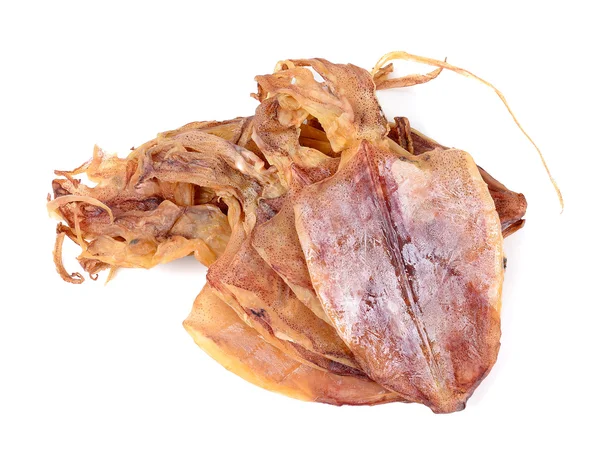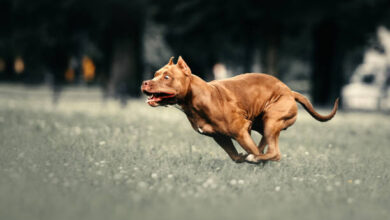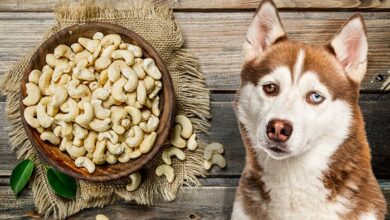Can Dogs Eat Dried Squid? Understanding the Risks-2024

Can Dogs Eat Dried Squid? Yes, dogs can eat dried squid, but it should only be given in moderation. Plain, unseasoned dried squid is safer than seasoned varieties, which may contain harmful ingredients like salt and spices.
Not all dogs tolerate seafood well, so it’s important to introduce it cautiously. Always watch for any signs of discomfort and adjust based on your dog’s health and reactions. So,let’s briefly discuss that- Can Dogs Eat Dried Squid?
Nutritional Benefits of Dried Squid for Dogs-Can Dogs Eat Dried Squid?
Can dogs eat dried squid? When fed in moderation, dried squid can offer several nutritional benefits. While it’s important to be cautious due to potential risks like high sodium content, dried squid does have some positive aspects that may be beneficial to your dog’s health.
1. High in Protein
- Why It’s Good: Dried squid is packed with protein, which is essential for muscle growth and repair. Protein is a critical nutrient that helps maintain your dog’s muscle mass, supports their immune system, and promotes overall health.
- How It Helps: Protein helps repair tissues and cells in your dog’s body and is a key part of building and maintaining strong muscles and organs.
2. Rich in Omega-3 Fatty Acids
- Why It’s Good: Omega-3 fatty acids are essential for maintaining healthy skin and a shiny coat. These healthy fats also support the cardiovascular system and have anti-inflammatory properties.
- How It Helps: Omega-3s help improve your dog’s coat quality, reduce itching or dry skin, and may even aid in reducing inflammation related to arthritis or other conditions.
3. Low in Carbohydrates
- Why It’s Good: Dried squid is naturally low in carbohydrates, which makes it suitable for dogs on low-carb diets. It can serve as a protein-packed treat without contributing to unnecessary weight gain.
- How It Helps: Dogs on low-carb diets may benefit from treats that don’t increase their carbohydrate intake, especially those that are overweight or have certain health conditions like diabetes.
4. Contains Essential Minerals
- Why It’s Good: Dried squid contains several essential minerals, such as iron, phosphorus, and magnesium, that are important for your dog’s overall health.
How It Helps:
- Iron: Supports red blood cell production and helps in preventing anemia.
- Phosphorus: Helps maintain strong bones and teeth.
- Magnesium: Supports muscle and nerve function, ensuring your dog stays active and healthy.
In moderation, can dogs eat dried squid can offer some valuable nutritional benefits. The high protein content helps with muscle growth and repair, while the omega-3 fatty acids promote healthy skin and a shiny coat. Dried squid is low in carbohydrates, making it suitable for low-carb diets, and it also contains essential minerals like iron, phosphorus, and magnesium. Always keep portion sizes in mind to avoid the risks associated with excess sodium and additives.
Understanding the Risks of Dried Squid for Dogs
Can dogs eat dried squid? While dried squid may seem like a tasty snack, it’s important to understand the potential risks involved. Several factors can make dried squid harmful to dogs if not given with caution. Here’s a breakdown of the key risks associated with feeding dried squid to your dog.
1. High Sodium Content
- Why It’s Risky: Dried squid contains high levels of sodium, which can lead to dehydration in dogs. Too much salt can also result in sodium poisoning, which can be life-threatening.
- Symptoms of Overdose: Excessive thirst, frequent urination, vomiting, and diarrhea are signs that your dog may have consumed too much sodium.
2. Seasonings and Additives
- Why It’s Risky: Many dried squid snacks are flavored with seasonings like garlic, onion, and other spices, which are toxic to dogs. Garlic and onion, even in small amounts, can damage your dog’s red blood cells and cause anemia.
- Toxic Ingredients: It’s crucial to avoid any squid that contains these harmful seasonings to prevent serious health issues.
3. Choking Hazard
- Why It’s Risky: Dried squid is often tough and chewy, which can pose a choking hazard, especially for small dogs. If the pieces are too large or not properly cut into small portions, dogs may have difficulty chewing them properly.
- Precaution: Always cut dried squid into small, manageable pieces to reduce the risk of choking, especially for smaller dogs.
4. Digestive Issues
- Why It’s Risky: Dogs with sensitive stomachs may have trouble digesting dried squid. Overeating or consuming large amounts can cause stomach upset, leading to vomiting, diarrhea, or bloating.
- Symptoms to Watch For: If your dog starts showing signs of digestive discomfort after eating dried squid, such as excessive drooling, diarrhea, or an upset stomach, it may be time to consult your vet.
Can dogs eat dried squid? While it does have some nutritional benefits, the risks associated with dried squid—such as high sodium, toxic additives, choking hazards, and digestive issues—make it a treat that should be given with extreme caution. Always make sure to monitor your dog’s reaction and choose unsalted, unseasoned squid in moderation.
Signs of Adverse Reactions in Dogs
Can dogs eat dried squid? While dried squid can be a tasty snack for dogs in moderation, it’s important to be aware of the signs that your dog may be having an adverse reaction. Some dogs can be sensitive to certain foods, including dried squid. Here are the key signs to watch for:
1. Excessive Thirst and Frequent Urination
- What It Means: If your dog is drinking more water than usual and urinating frequently, it could be a sign of sodium overload from the dried squid.
- Why It Happens: Dried squid is high in sodium, which can cause dehydration in dogs. This can lead to excessive thirst as their body tries to balance the salt levels.
2. Vomiting, Diarrhea, or Bloating
- What It Means: Digestive upset is a common reaction to dried squid, especially if it’s not properly digested or if your dog ate too much.
- Why It Happens: The tough texture of dried squid can cause digestive issues like vomiting, diarrhea, or bloating, particularly in dogs with sensitive stomachs.
3. Lethargy or Weakness
- What It Means: If your dog seems unusually tired, weak, or less active than normal, it could be a sign of an adverse reaction to dried squid.
- Why It Happens: Sodium poisoning or an allergic reaction can lead to lethargy as the dog’s body tries to cope with the imbalance.
4. Itching, Swelling, or Hives
- What It Means: Itching, swelling, or hives may indicate an allergic reaction to dried squid, especially if your dog has sensitivities to seafood.
- Why It Happens: Some dogs may be allergic to the proteins in squid, leading to skin reactions like itching or swelling.
If you notice any of these signs after your dog eats dried squid, it’s important to take action immediately. Can dogs eat dried squid? In moderation, yes, but always keep a close eye on your dog after giving them this treat to ensure they don’t experience any adverse reactions. If symptoms persist or worsen, consult your veterinarian for guidance.
What to Do If Your Dog Eats Too Much Dried Squid
If your dog has eaten too much dried squid, it’s important to act quickly to minimize potential health risks. Can dogs eat dried squid? While occasional small pieces are usually safe, overeating can lead to complications. Here’s what you should do if your dog consumes too much:
1. Provide Fresh Water
- Why It Helps: Dried squid is high in sodium, and drinking water helps flush out excess salt from your dog’s system. This can reduce the risk of dehydration and sodium poisoning.
- Action: Make sure your dog has constant access to fresh, clean water. Encourage them to drink to help rehydrate and balance their electrolytes.
2. Monitor Your Dog
- Why It’s Important: Keep an eye on your dog for any signs of discomfort or illness after eating dried squid. Look for symptoms like vomiting, diarrhea, lethargy, or excessive thirst.
- Action: Watch for the first signs of a negative reaction, such as a decrease in energy or any changes in behavior. Monitoring closely will help you catch any issues early.
3. Contact Your Vet
- Why It’s Necessary: If your dog shows severe symptoms, such as vomiting, diarrhea, tremors, or confusion, it’s crucial to consult a veterinarian.
- Action: Reach out to your vet right away, especially if symptoms persist or worsen. They can provide expert advice and determine if treatment is needed.
4. Avoid Giving More
- Why It’s Important: Dried squid should not be a regular part of your dog’s diet. Its high sodium content can lead to long-term health issues if given too frequently.
- Action: For future reference, limit dried squid to an occasional treat and ensure it’s given in moderation to avoid health problems.
If your dog eats too much dried squid, it’s important to stay calm and take the right steps. Can dogs eat dried squid? Yes, but only in moderation. Always monitor your dog for signs of negative reactions and contact your vet if necessary. By taking these precautions, you can help keep your dog safe and healthy.
Safer Alternatives to Dried Squid
If you’re wondering, can dogs eat dried squid? While dried squid can offer some nutritional benefits, it’s important to be mindful of the risks associated with its high sodium content and potential additives. Fortunately, there are safer, healthier alternatives that can provide your dog with a tasty treat. Here are some options:
1. Plain Cooked Fish
- Best Options: Salmon, cod, or whitefish (ensure it’s unseasoned).
- Why It’s Safe: Fish is a great source of protein and omega-3 fatty acids, which promote a healthy coat and skin. Cooking the fish without seasoning ensures it’s safe and free from harmful ingredients like garlic or onion.
- Tip: Remove any bones before offering fish to your dog, as they can pose a choking hazard.
2. Freeze-Dried Fish Treats
- What They Are: Specially made treats designed for dogs that are freeze-dried to maintain the fish’s nutrients.
- Why It’s Safe: These treats are specifically formulated for dogs and provide balanced nutrition without the added risks of excess sodium or unhealthy seasonings.
- Tip: Choose high-quality, dog-friendly freeze-dried fish that’s free from preservatives and additives.
3. Boiled Chicken or Turkey
- Why It’s Safe: Chicken or turkey provides lean protein that is easy for dogs to digest. Boiling the meat without seasoning ensures that it remains healthy and free from potentially harmful additives.
- Tip: Cut the chicken or turkey into small pieces to prevent choking and to make it easier for your dog to chew.
4. Vegetable Snacks
- Best Options: Carrots, cucumbers, or green beans.
- Why They’re Safe: Vegetables are low in calories and packed with vitamins, making them a healthy and nutritious snack. They also offer a great crunch that many dogs enjoy.
- Tip: Always wash vegetables thoroughly and cut them into bite-sized pieces to avoid any choking hazards.
While can dogs eat dried squid? Yes, but in moderation and with caution. For regular treats, consider safer alternatives like plain cooked fish, freeze-dried fish treats, boiled chicken or turkey, and vegetables. These options are healthier and free from the potential risks associated with dried squid, ensuring your dog enjoys a tasty and safe snack!



